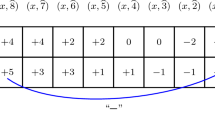Abstract
The general behavior of combinatorial scoring games is not well-understood. In this paper, we focus on a special class of “well-tempered” scoring games. By analogy with Grossman and Siegel’s notion of even- and odd-tempered normal play games, we declare a dicot scoring game to be even-tempered if all its options are odd-tempered, and odd-tempered if it is not atomic and all its options are even-tempered. Games of either sort are called well-tempered. These show up naturally when analyzing one of the “knot games” introduced by Henrich et al. We consider disjunctive sums of well-tempered scoring games, and develop a theory for them analogous to the standard theory of disjunctive sums of normal play partizan games. We isolate a special class of inversive well-tempered games which behave like normal play partizan games or like the “Milnor games” considered by Milnor and Hanner. In particular, inversive games (modulo equivalence) form a partially ordered abelian group, and there is an effective description of the partial order. Moreover, the full monoid of well-tempered scoring games (modulo equivalence) admits a complete description in terms of the group of inversive games. We also describe several examples of well-tempered scoring games and provide dictionaries listing the values of some small positions in two of these games.



Similar content being viewed by others
Notes
If \(G\) is one of Stewart’s scoring play games, then the outcome of the game \(G + \{|x^3|\{0|0|-x^2\} + \{x|-x|\}\}\) for \(x \in \mathbb R \), \(x >> 0\) is the same as the misère outcome of \(G\). Indeed, Right can only safely move to \(\{0|0|-x^2\} + \{x|-x|\}\) after exhausting his options in \(G\), and if he does so, he will win.
In other words, \(G \sim _E H\) if and only if
$$\begin{aligned} \mathrm{L }(G + X) = \mathrm{L }(H + X) \text { and } \mathrm{R }(G + X) = \mathrm{R }(H + X) \end{aligned}$$for all scoring games \(X\). Even if \(G\) and \(H\) are both Milnor games, this doesn’t necessarily agree with \(\sim _M\). For example, \(0\) and \(\langle 0 | 0 \rangle \) are equivalent as Milnor games, but \(0 \not \sim _E \langle 0 | 0 \rangle \) because \(0 + \langle -1|1 \rangle \) and \(\langle 0 | 0 \rangle + \langle -1 | 1 \rangle \) have different outcomes. Note \(\langle -1 | 1 \rangle \) is not a Milnor game. Ettinger denotes the relation \(\sim _E\) with \(\equiv \), which we avoid since it seems to clash with the notational conventions of Conway (2001) and Berlekamp et al. (2001).
The additional generality will not affect the notion of equivalence or the resulting monoid, by Proposition 1. Working with well-tempered games rather than fixed-length games is necessary to get canonical forms.
We use the terminology “well-tempered” due to the similarities between our definition and Grossman and Siegel’s definition of well-tempered normal play games Grossman (2009). There is no direct connection between these concepts, however.
References
Berlekamp ER, Conway JH, Guy RK (2001) Winning ways for your mathematical plays, 2nd edn. A K Peters, Wellesley
Blanco SA, Fraenkel AS (2006) Triomineering, tridomineering and L-tridomineering. http://www.math.cornell.edu/~sabr/papers/triomineering.pdf
Conway JH (2001) On numbers and games, 2nd edn. A K Peters, Wellesley
Ettinger JM (1996) On the semigroup of positional games. http://citeseerx.ist.psu.edu/viewdoc/summary?doi=10.1.1.37.5278
Ettinger JM (2000) A metric for positional games. http://citeseerx.ist.psu.edu/viewdoc/summary?doi=10.1.1.37.7498
Grossman JP, Siegel AN (2009) Reductions of partizan games. In: Albert MH, Nowakowski RJ (eds) Games of No Chance 3, no. 56 in Mathematical Sciences Research Institute Publications, Cambridge University Press, Cambridge, pp 427–445
Hanner O (1959) Mean play of sums of positional games. Pacific J Math 9(1):81–99
Henrich A, MacNaughton N, Narayan S, Pechenik O, Silversmith R, Townsend J (2011) A midsummer knot’s dream. Coll Math J 42:126–134
Milnor JW (1953) Sums of positional games. In: Kuhn HW, Tucker AW (eds) Contributions to the theory of games II, no. 28 in Annals of Mathematics Studies. Princeton University Press, Princeton, pp 291–301
Plambeck TE (2009) Advances in losing. In: Albert MH, Nowakowski RJ (eds) Games of No Chance 3, no. 56 in Mathematical Sciences Research Institute Publications. Cambridge University Press, Cambridge, pp 57–89
Stewart F (2013) Scoring play combinatorial games. Games of No Chance 5. To appear. Accessed from arXiv:1202.4653v3
Acknowledgments
This work was done in part during REU programs at the University of Washington in 2010 and 2011, and in part while supported by the NSF Graduate Research Fellowship Program (Grant No. DGE 1106400) in 2011–2013. The author would like to thank Rebecca Keeping, James Morrow, Neil McKay, and Richard Nowakowski, with whom he discussed the content of this paper, as well as Allison Henrich, who introduced the author to the game of To Knot or Not to Knot, which initiated this entire investigation. The author would also like to thank the anonymous referees for their constructive feedback.
Author information
Authors and Affiliations
Corresponding author
Rights and permissions
About this article
Cite this article
Johnson, W. The combinatorial game theory of well-tempered scoring games. Int J Game Theory 43, 415–438 (2014). https://doi.org/10.1007/s00182-013-0386-6
Accepted:
Published:
Issue Date:
DOI: https://doi.org/10.1007/s00182-013-0386-6




